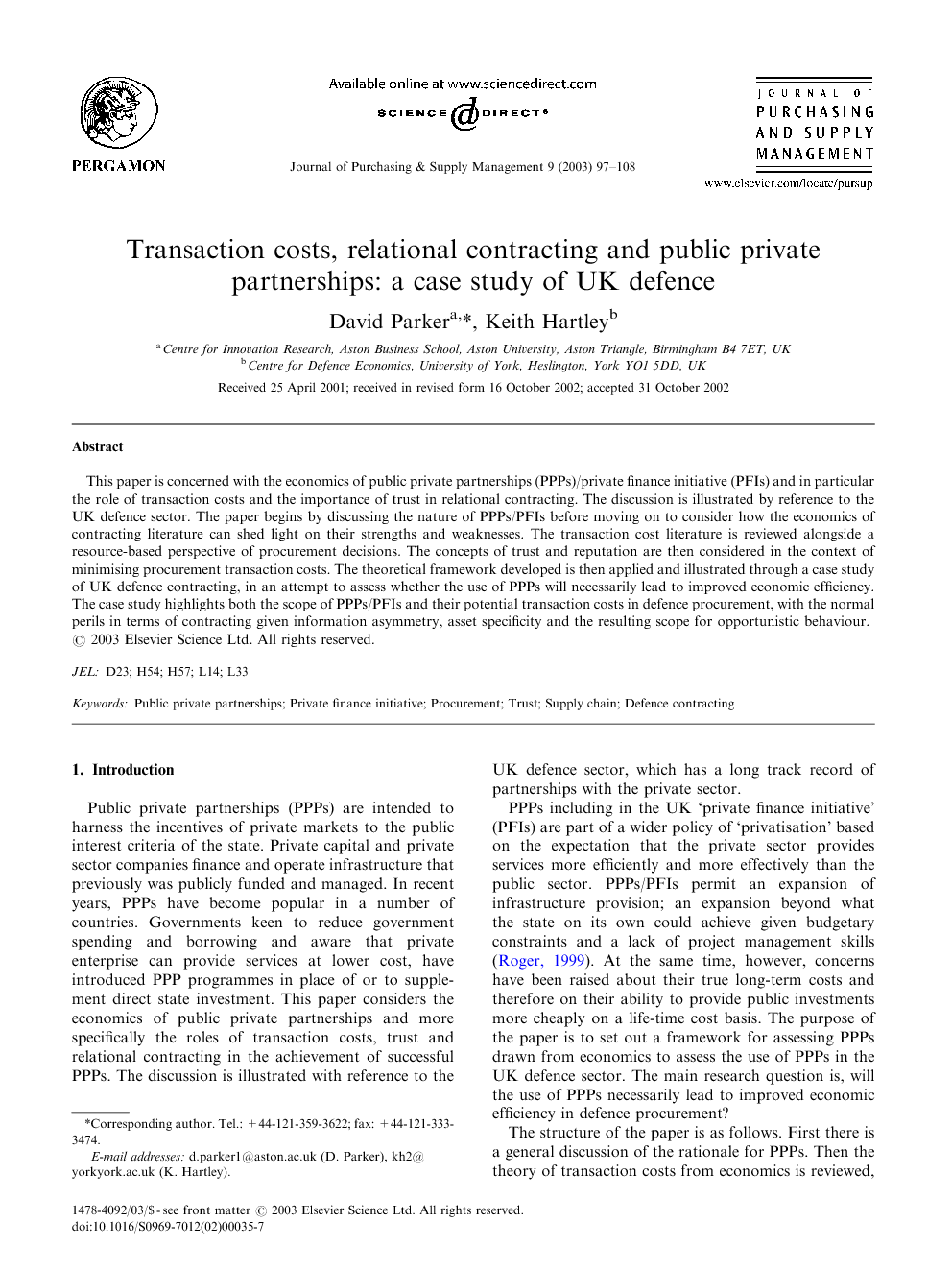ترجمه فارسی عنوان مقاله
هزینه های معامله، قرارداد های رابطه ای و مشارکت عمومی خصوصی: یک مطالعه موردی از دفاع UK
عنوان انگلیسی
Transaction costs, relational contracting and public private partnerships: a case study of UK defence
| کد مقاله | سال انتشار | تعداد صفحات مقاله انگلیسی |
|---|---|---|
| 14789 | 2003 | 12 صفحه PDF |
منبع

Publisher : Elsevier - Science Direct (الزویر - ساینس دایرکت)
Journal : Journal of Purchasing and Supply Management, Volume 9, Issue 3, May 2003, Pages 97–108
فهرست مطالب ترجمه فارسی
چکیده
مقدمه
مشارکت خصوصی عمومی
اقتصاد قرارداد
اعتبار، اعتماد و انگیزه
مطالعه موردی: دفاع UK
نتیجه
منابع
ترجمه کلمات کلیدی
مشارکت خصوصی عمومی - ابتکار مالی خصوصی - تدارکات - اعتماد - زنجیره تامین - قرارداد دفاع
کلمات کلیدی انگلیسی
Public private partnerships,Private finance initiative,Procurement, Trust,Supply chain,Defence contracting
ترجمه چکیده
در این مقاله در رابطه با اقتصاد از مشارکت عمومی خصوصی ( PPPS ) / ابتکار عمل خصوصی امور مالی ( PFIs ) و به ویژه نقش هزینه های معاملاتی و اهمیت اعتماد در قرارداد ارتباطی است . بحث با اشاره به بخش دفاع UK نشان داده شده است . در این مقاله با بحث در مورد ماهیت PPPS / PFIs قبل از حرکت در نظر بگیرید که چگونه اقتصاد از قرارداد ادبیات می تواند نور را در نقاط قوت و ضعف خود ریخته آغاز می شود. ادبیات هزینه معامله کنار یک دیدگاه مبتنی بر منابع از تصمیم گیری های خرید را بررسی کرد. مفاهیم اعتماد و شهرت هستند و سپس در زمینه به حداقل رساندن هزینه های مبادله تدارکات در نظر گرفته . چارچوب نظری توسعه یافته است و سپس اعمال می شود و نشان داده شده را از طریق یک مطالعه موردی از انقباض دفاع UK ، در تلاش برای ارزیابی اینکه آیا استفاده از PPPS لزوما به بهره وری اقتصادی بهبود یافته منجر خواهد شد . مطالعه موردی برجسته هر دو دامنه PPPS / PFIs و هزینه های معامله بالقوه آنها در تدارک دفاع ، با خطرات طبیعی در شرایط قرارداد با توجه به عدم تقارن اطلاعات ، ویژگی دارایی ها و دامنه در نتیجه برای رفتار های فرصت طلب .
ترجمه مقدمه
مشارکت خصوصی عمومی ( PPPS ) در نظر گرفته شده به بهره برداری از انگیزه های بازار خصوصی به معیار منافع عمومی از دولت است. سرمایه و بخش خصوصی شرکت های خصوصی تامین مالی و راه اندازی زیرساخت که قبلا عمومی بودجه و مدیریت شد. در سال های اخیر، PPPS در تعدادی از کشورهای محبوب تبدیل شده اند . دولت ها علاقه مند به کاهش هزینه های دولت و قرض گرفتن و آگاه باشید که شرکت های خصوصی می توانند خدمات با هزینه کمتر ارائه ، برنامه های PPP در محل و یا معرفی شده اند برای تکمیل سرمایه گذاری مستقیم دولت است. در این مقاله اقتصاد از مشارکت های خصوصی و دولتی و به طور خاص نقش هزینه های معامله، اعتماد و قرارداد رابطه در دستیابی به موفقیت PPPS در نظر می گیرد . بحث با اشاره به بخش دفاع UK ، که دارای یک سابقه طولانی از همکاری با بخش خصوصی نشان داده شده است .
PPPS از جمله در " ابتکار مالی خصوصیUK ( PFIs ) بخشی از سیاست گسترده تر از ' خصوصی ' بر اساس انتظار می رود که بخش خصوصی ارائه خدمات موثر تر و موثر تر از بخش دولتی است. PPPS / PFIs اجازه گسترش تامین زیرساخت ، گسترش فراتر از آنچه که دولت خود را در آن می تواند دستیابی به محدودیت های بودجه و فقدان مهارت های مدیریت پروژه ( راجر ، 1999) داده شده است. در همان زمان ، با این حال ، نگرانی در مورد هزینه های دراز مدت واقعی خود را و در نتیجه بر توانایی خود را برای ارائه سرمایه گذاری های عمومی را ارزان تر در طول عمر بر اساس هزینه مطرح شده است. هدف از این مقاله، مجموعه ای از یک چارچوب برای ارزیابی PPPS برگرفته از اقتصاد به بررسی استفاده از PPPS در بخش دفاع UK . سوال اصلی پژوهش است ، خواهد شد استفاده از PPPS لزوما به بهبود بهره وری اقتصادی در تدارکات دفاعی منجر شود؟
ساختار مقاله به شرح زیر است . اول این است که یک بحث کلی از دلایل برای PPPS وجود دارد. سپس تئوری هزینه های معامله از اقتصاد بررسی می شود ، و پس از بحث در مورد نقش شهرت و اعتماد در قرارداد های رابطه ای و سرمایه گذاری مشترک . چارچوب نظری توسعه یافته است و سپس به قرارداد دفاع UK ، که در آن بسیاری از مسائل دشوار مربوط معاملات PPP قابلیت استفاده شود. در نهایت، نتیجه گیری اصلی برای تهیه دفاع هستند خلاصه شده است.

